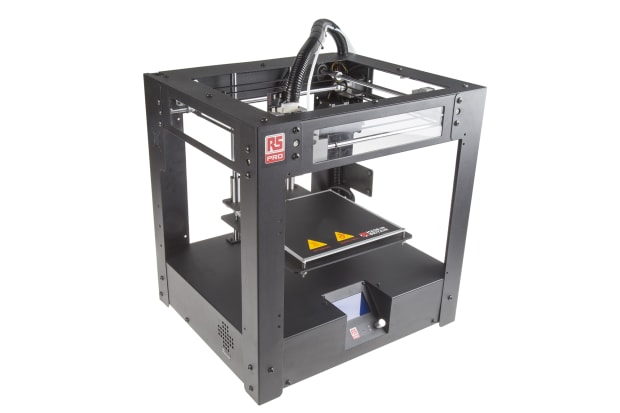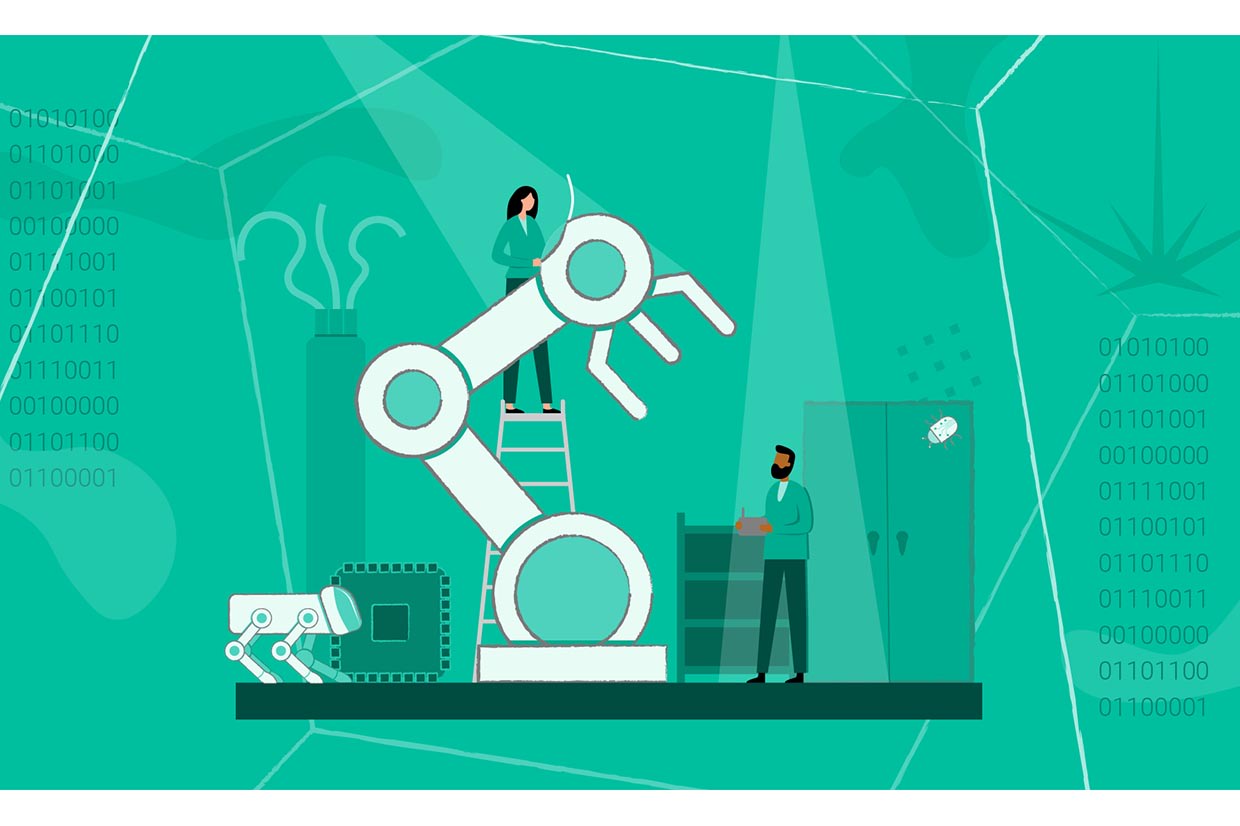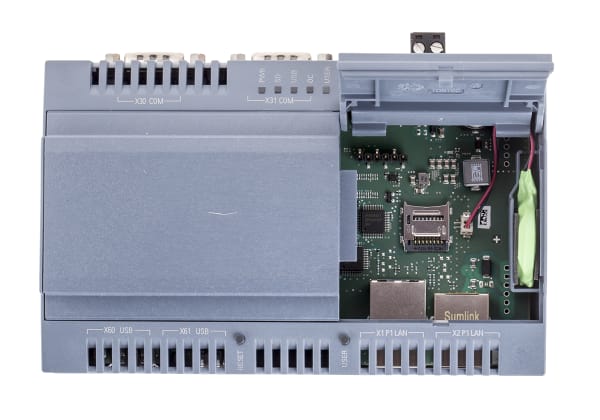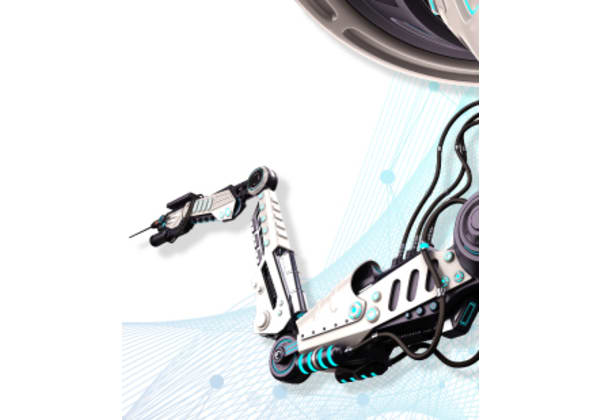- Published 24 Jun 2024
- Last Modified 24 Jun 2024
- 6 min
Trends in Smart Automotive Manufacturing
Robotics, 3D printing, and digital twin technologies are some smart manufacturing tools changing the automotive industry. Find out more in this article.

Reviewed by David Carmichael, Solution Engineer (May 2024)
Technology trends in the automotive industry are embracing the Fourth Industrial Revolution (Industry 4.0). Its explosion of interconnected devices (the Internet of Things, or IoT) allows automotive manufacturing to deploy robotics, 3D printing, and AI like never before. The benefits of Industry 4.0 in the automotive industry, which has deployed cutting-edge tech for decades, bring new efficiencies and possibilities for the making and owning of cars.
How are Smart Technologies Being Integrated into the Automotive Manufacturing Process?
Industry 4.0 is helping achieve smart manufacturing for automotive companies. No stranger to robotics or automation, automotive manufacturing is enhancing them with interconnection and data analytics to unlock these technologies’ full potential. More recent innovations like additive manufacturing, digital twins, and AI are also finding transformative roles in this industry. Thoughtfully planning how to make these technologies and their human operators work together and act on collected data is necessary for attaining smart automotive manufacturing.
Smart Automotive Manufacturing Solutions
Industry 4.0 examples in automotive manufacturing include 3D printing, robotics, digital twins, and AI. These, coupled with all the interconnections of the automotive industry Internet of Things, have great potential for overcoming automotive industry challenges.
Additive Manufacturing in the Automotive Industry
Additive manufacturing, such as 3D printing, is among the technology trends in the automotive industry due to its potential for making parts and prototypes quickly and inexpensively.

- Part Design: Additive manufacturing can use a single operation and material to create shapes that would otherwise require moulds, multiple machining operations, or different materials — or shapes previously impossible to produce! It also allows optimising parts for weight by easily cutting out dead weight zones. 3D printing can even make replacements for long-discontinued parts, which can serve and satisfy customers who own older vehicles
- Prototypes: 3D printing is a cornerstone of rapid prototyping since it allows printing designs so quickly. This speeds up design iterations, minimises time spent on poor ideas, and gets new ideas to market faster
- Inventory: Faster manufacturing and smaller batches mean shorter lead times and reduced safety stock levels. This reduces capital tied up in inventoried parts and storage facilities and eliminates some automotive industry supply chain challenges
Robotics in Automotive Manufacturing
One of the challenges of Industry 4.0 for automotive manufacturers is deploying robotics, long a mainstay for the industry, to maximise efficiency while keeping humans useful and safe.
Benefits of Industry 4.0 in the automotive industry’s robotics chiefly include more widespread interconnection between robots, other manufacturing machines, and ERP systems. When these systems automatically talk to each other, they synchronise and optimise their interdependent operations and achieve truly smart manufacturing for automotive companies.
Automated Guided Vehicles (AGVs) are robots that can transport payloads around facilities. They unlock modularity and reduce constraints in automotive manufacturing since they can decouple materials from rigid assembly lines. This in turn allows more production customisation by letting workstations easily adjust to different vehicle needs.
Industry 4.0 trends also include the rise of collaborative robots, or cobots. A cobot teams up with a human operator and handles tasks that could otherwise be monotonous or unsafe, letting the human focus on tasks that require ingenuity or judgment calls (including programming the cobot). Cobot tasks can include lifting heavy objects, placing alignment-critical parts with high accuracy, reaching areas difficult or straining for the worker to access, and picking parts the human requests.
Above all, automotive future technology using robotics must consider safety first: designing in sensors and protocols to be aware of humans and work around them effectively.

Digital Twins in Automotive Manufacturing
A digital twin is a simulation of a complete, physical item, be it a single car or an entire automotive manufacturing facility. Using data collected long-term from IoT technology, a digital twin simulates and projects the performance of its physical twin. This allows for assessing its performance efficiency, predicting future failure points, and experimenting with changes to designs or materials before their implementation — all displayed to engineers in a helpful graphical form.
With their factory fully modelled digitally, automotive manufacturing companies can monitor their performance to see which systems are suboptimal and learn how systems affect each other. This can help spur continuous improvement measures and eliminate wasteful practices. Similarly modelling and monitoring cars’ performance can show companies how well their designs work and what they need to change to compete.
Digital twins enable predictive maintenance by extrapolating collected data into long-term predictions of machine performance. Vibrational irregularities in manufacturing machines can lead to costly breakdowns over time, and digital twins can predict this and call for proactive maintenance accordingly. Digital twins can also predict cars’ component service lives and help plan maintenance schedules — and adjust them based on individual cars’ performance data.
With a digital twin, you can avoid the expense, uncertainty, and development time for improvement measures. The twin can predict plans’ short and long-term effects on a plant’s operations, letting you select and implement the best plans sooner. Digital twins’ AI can also identify flaws in new vehicle designs.
Big Data in the Automotive Industry
Industry 4.0 trades in large quantities of data. Interactions between automotive future technology and Big Data will include:
- Cars designed with more instrumentation, and car manufacturing adjusted accordingly
- An optimised automotive industry supply chain
- Increased importance and budgets for data storage, computing power, and security
- Detailed insight into consumer preferences and behaviour
- Focused studies of emissions, including presenting data to a scrutinous public
Automotive Manufacturing Automation
With automotive manufacturing’s increased use of robotics and other IoT devices, comes greater automation potential. Automation has a long history in the industry, and AI looks to be a big part of its future.
Advances in machine vision technologies and AI allow automatic detection of measurement values, quality defects, assembly errors, and safety hazards. This can greatly reduce the chances of shipping vehicles that could perform poorly or cause harm.
Robotic process automation (RPA) is software that can execute tasks humans normally do on computer programs - typically repetitive, mundane tasks. In automotive manufacturing, RPA can manage and automate inventory, shipping, recalls, and bills of material. This both improves efficiency and frees human workers to do more engaging work.
Automation will also continue to be a part of automotive technology in the form of self-driving cars. Previously the stuff of science fiction, autonomous vehicles are a very real technology — albeit one that will require careful deployment and willing consumers to become a safe, everyday product.
Challenges of AI in the automotive industry include careful management of data security, managing the infrastructure for all the data storage and processing, and training the right people to manage AI applications.
What is the Impact of Industry 4.0 in the Automotive Industry?
As the automotive industry leans into Industry 4.0, it will gain better control of its processes and be able to rise to its consumers’ latest demands - customisability, personalised experiences, connection with other devices, and sustainable practices.
Explore RS to learn more about industrial IoT solutions and the parts they’ll play in automotive future technology.
Related Articles
Related links
- Smart Manufacturing and Sustainable Energy
- The Industrial IoT and Smart Factories
- IN Your Future
- Understanding and Preventing Hand-arm Vibration Syndrome (HAVS)
- Smart Solutions for Food & Drink Manufacturing
- MikroElektronika Development Kit Gas Alarms in the Automotive Industry, Various Environmental Pollution Measurement and
- Five ways to tackle the challenges of food and beverage manufacturing today
- A Guide to Food Contamination


